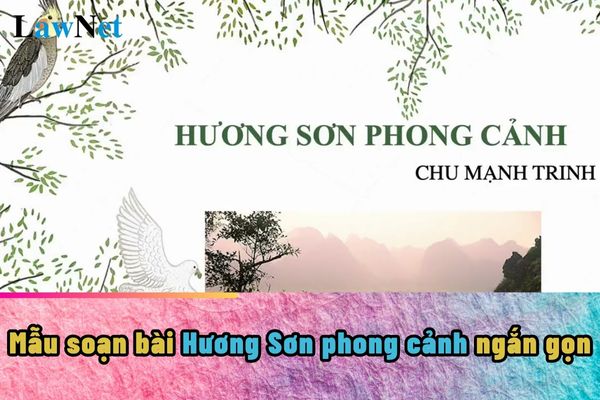What are guidelines on preparing the lesson "Hương Sơn phong cảnh" for students in Vietnam? What contents do grade 10 students in Vietnam need to know when learning the literary works in the Literature subject?
What are guidelines on preparing the lesson "Hương Sơn phong cảnh" for students in Vietnam?
The lesson "Hương Sơn phong cảnh" is one of the contents in the grade 10 Literature subject.
Students can refer to the following lesson plan for "Hương Sơn phong cảnh":
|
Guidelines on preparing the lesson "Hương Sơn phong cảnh" * Main Content: * Art in the Poem: |
* Note: The above information is for reference only./.

What are guidelines on preparing the lesson "Hương Sơn phong cảnh" for students in Vietnam? What contents do grade 10 students in Vietnam need to know when learning the literary works in the Literature subject? (Image from the Internet)
What contents do grade 10 students in Vietnam need to know when learning the literary works in the Literature subject?
In Subsection 2 Section 5 of the Literature curriculum in the general education program issued together with Circular 32/2018/TT-BGDDT, it is stipulated that Grade 10 students' literary knowledge includes:
- The main inspiration of the work
- The story, third-person narrator (omniscient narrator), first-person narrator (limited narrator), point of view in the story
- Some elements of epic and mythological stories: space, time, plot, narrator, characters, narrator's and characters' dialogue, etc.; the value and vitality of epics
- Aesthetic value of some formal elements in poetry
- Some elements of folk opera or traditional plays: anonymity, themes, story tales, characters, dialogues, methods of transmission, etc.
- Historical or cultural, social context and the work
- Basic understanding of Nguyen Trai to aid the reading comprehension of some representative works of this author
- The proximity of content between literary works of different cultures
- Literary works and the reader.
What subjects are included in the new Grade 10 curriculum in Vietnam?
Based on Section 4 of the Overall Education Program issued together with Circular 32/2018/TT-BGDDT (amended by Article 1 Circular 13/2022/TT-BGDDT) regarding the education plan:
EDUCATION PLAN
The general education program is divided into two stages: basic education stage (from Grade 1 to Grade 9) and career-oriented education stage (from Grade 10 to Grade 12).
The system of subjects and educational activities in the general education program includes mandatory subjects and educational activities, and elective career-oriented subjects (referred to as elective subjects) and optional subjects.
The actual learning time in a school year is equivalent to 35 weeks. Educational institutions can organize teaching 1 session/day or 2 sessions/day. Institutions that teach 1 session/day and those that teach 2 sessions/day must both implement the compulsory unified educational content for all educational institutions nationwide.
When entering Grade 10 the new Grade 10 program for 2024-2025, the students need to prepare to enter the career-oriented education stage by choosing subjects as follows:
*Career-oriented Stage
- Mandatory subjects and educational activities: Literature; Mathematics; Foreign Language 1; History; Physical Education; National Defense and Security Education; Experiential Activities, Vocational Orientation; Local Educational Content.
- Elective subjects: Geography, Economics and Law Education, Physics, Chemistry, Biology, Technology, Informatics, Music, Fine Arts.
- Students choose 4 subjects from the elective subjects.
- Learning topics: Each subject including Literature, Mathematics, History, Geography, Economics and Law Education, Physics, Chemistry, Biology, Technology, Informatics, Music, Fine Arts has several study topics forming clusters of study topics for the subject to fulfill deep differentiation requirements, helping students enhance knowledge and practical skills, apply learned knowledge and skills to solve real-life problems, meeting career orientation requirements. The time allocated for each study topic is 10 or 15 periods; the total time for the cluster of study topics for a subject is 35 periods per school year.
In each Grade 10, 11, 12, students choose 3 clusters of study topics from 3 subjects suitable to their aspirations and their school's organizational capacity.
- Schools can create subject combinations from the subjects and study topics mentioned above to meet the learners' needs and ensure compatibility with the school's teacher resources, facilities, and teaching devices.
Optional subjects: Ethnic minority language, Foreign Language 2.

